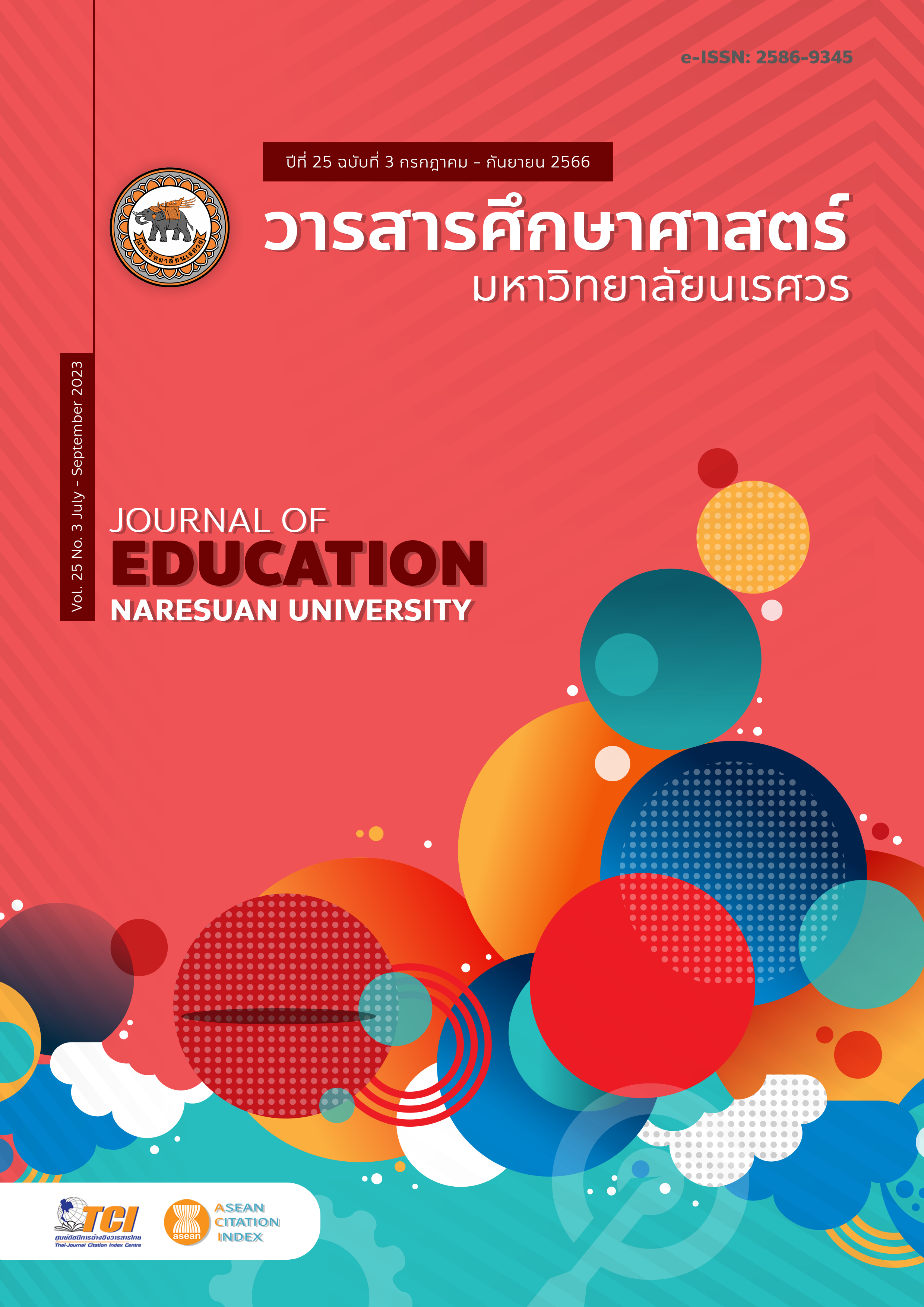DEVELOPMENT OF SCIENCE COMMUNICATION ABILITIES OF 11TH GRADE ETHNICALLY DIVERSE STUDENTS USING PHENOMENON-BASED LEANING IN TOPIC OF RESPIRATORY SYSTEM การพัฒนาความสามารถในการสื่อสารวิทยาศาสตร์ด้วยการจัดการเรียนรู้แบบปรากฏการณ์เป็นฐาน เรื่อง ระบบหายใจ สำหรับนักเรียนระดับชั้นมัธยมศึกษาปีที่ 5 ที่มีความหลากหลายทางชาติพันธุ์
Main Article Content
Abstract
This research aimed to examine ways to implement the developed learning activities using phenomenon – based learning to develop science communication abilities in topic of respiratory system of 11th grade ethnically diverse students and to investigate the students’ science communication abilities through learning with the developed learning management. The participants were 30 ethnically diverse students in 11th grade of high school in Tak province. The research instruments consisted of three lesson plans using phenomenon – based learning in the topic respiratory system, reflective learning journals, writing and speaking science communication assessment. Data were analyzed by content analysis. The credibility of the analyzed qualitative data was examined by the triangulation method. The research results were that the steps of learning approach by using phenomenon – based learning to develop science communication abilities should be that: 1) teachers should select phenomenon that consider students' background, and use various media tools through learning; 2) local languages should be used during explaining and each group member’ role should be clearly assigned to facilitate group discussions; 3) teachers should provide example situations in which correspond to the phenomenon; 4) advices should be given in using media for students to be able to apply and enhance their learning; and 5) should be thoroughly reviewed and the preparation prior to the actual presentation should be highly encouraged. In examining students’ science communication abilities, it was found that ethnically diverse students’ writing and speaking science communication abilities tend to increase after learning through Phenomenon-based learning.
Article Details

This work is licensed under a Creative Commons Attribution-NonCommercial-NoDerivatives 4.0 International License.
The owner of the article does not copy or violate any of its copyright. If any copyright infringement occurs or prosecution, in any case, the Editorial Board is not involved in all the rights to the owner of the article to be performed.
References
Atjanawat, T. (2015). Development of science communication and teamwork abilities of eleventh grade students using group investigation (Master thesis). Bangkok: Chulalongkorn University. [in Thai]
Butkatanyoo, O. (2018). Phenomenon based learning for developing a learner’s holistic views and engaging in the real world. Chulalongkorn University Journal of Education Studies, 46(2), 348-365. [in Thai]
Chaiyakan, A. (2014). A development of Thai as a second language instructional model based on cultural and community approach by integrating the oral approach with the code-switching to enhance communicative ability of transition students towards first grade. Prae-wa Kalasin Journal of Kalasin University, 2(2), 84-100. [in Thai]
Daehler, K., & Folsom, J. (2016). Making sense of science: Phenomena-based learning. Retrieved April 17, 2019, from http://www.WestEd.org/mss
Islakhiyah, K., Sutopo, S., & Yulianti, L. (2017). Scientific Explanation of Light through Phenomenon-based Learning on Junior High School Student. 1st Annual International Conference on Mathematics, Science, and Education (ICoMSE 2017). DOI:10.2991/icomse-17.2018.31
Kijkiakul, S. (2014). Science learning management: Directions for 1st century 21. Phetchabun: Juladis Printing House. [in Thai]
Kompa, J. S. (2017). Remembering Prof. Howard Barrows: Notes on problem-based learning and the school of the future. Retrieved April 17, 2019, from https://joanakompa.com/tag/phenomenon-based-learning
Kulgemeyer, C., & Shecker, H. (2013). Student explaining science—assessment of science communication competence. Research in Science Education, 43(6), 2235-2256.
Laehsum S. (2017). Effect of Problem-based learning on Biology achievement, scientific communication skill and attitude towards science of grade 12 students (Master thesis). Songkla: Prince of Songkla University. [in Thai]
Lakshminarayan, P. (2019). Phenomenon Based Learning. Retrieved April 17, 2019, from https://www.mindbytes.co/uploads/7/3/7/4/7374149/phenomenon_based_learning_v1_pdf.pdf
Nielsen, V., & Davies, A. (2018). The What, why, and how of phenomenon based learning. Retrieved April 22, 2019, from https://www.onatlas.com/blog/phenomenon-based-Learning.
Office of the Education Council. (2017). The National education plan B.E. 2560-2579.Retrieved April 8, 2019, from http://www.lampang.go.th/public60/EducationPlan2.pdf [in Thai]
Samahito C. (2019). Phenomenon-based Learning experience provision for young children. Silpakorn University Journal, 39(1), 113-129. [in Thai]
Teachakaew S. (2017). Implementing flipped classroom to improve science communication skills of grade 11 students in nervous system and structure and movement system (Master thesis). Phitsanulok: Naresuan University. [in Thai]
The ministry of Education. (2008). The Basic Education Core Curriculum B.E. 2551 (A.D. 2008). Bangkok: Kurusapa Printing Ladphrao. [in Thai]
Zhukov, T. (2015). Phenomenon-based learning: What is PBL? Retrieved May 14, 2018, from https://www.noodle.com/articles/phenomenon-based-learning-what-is-pbl


